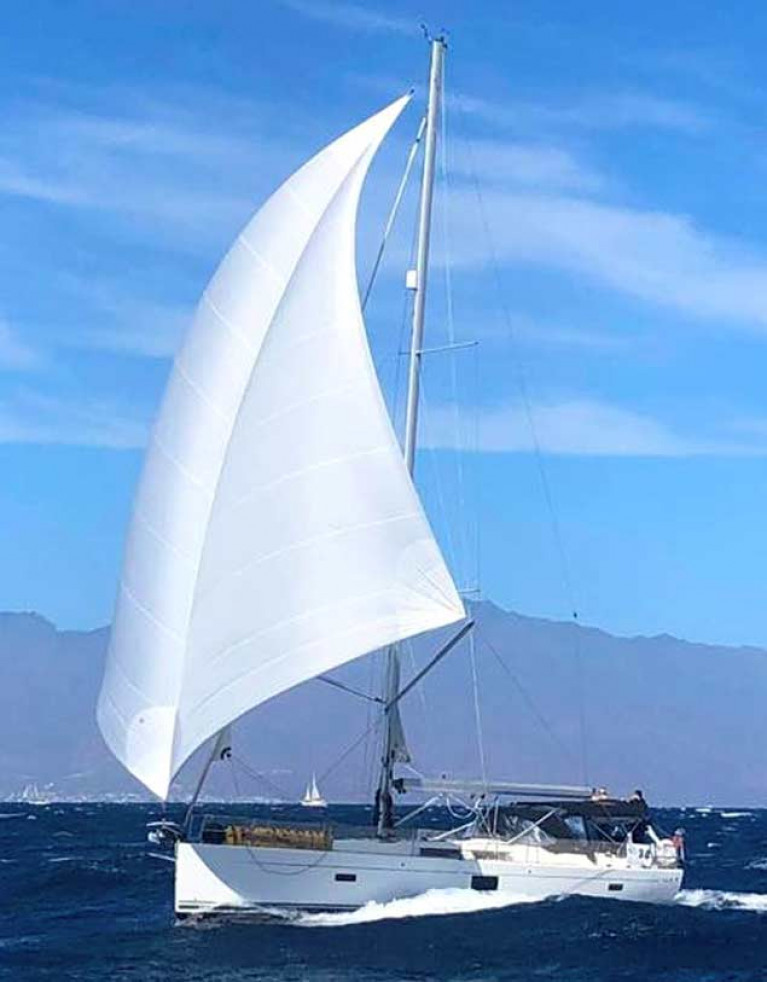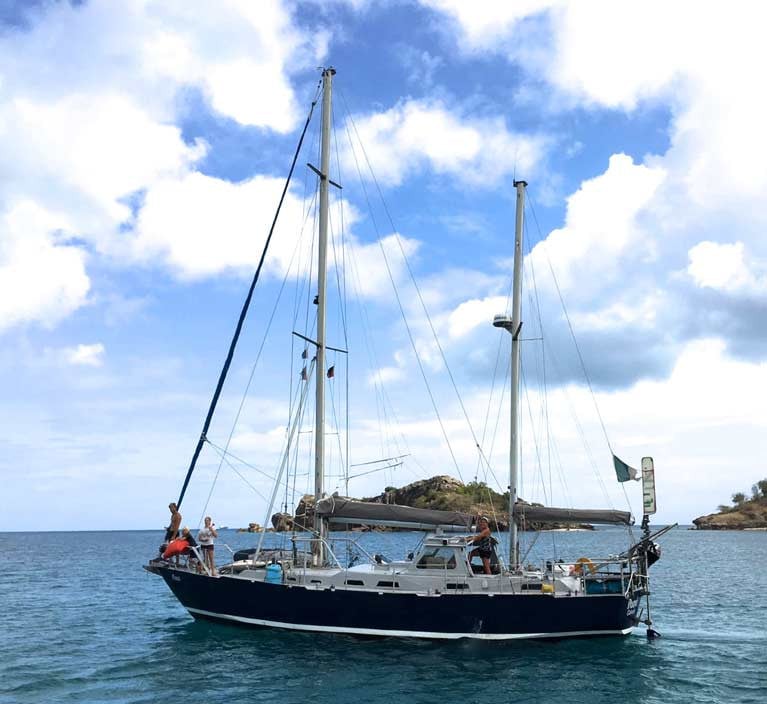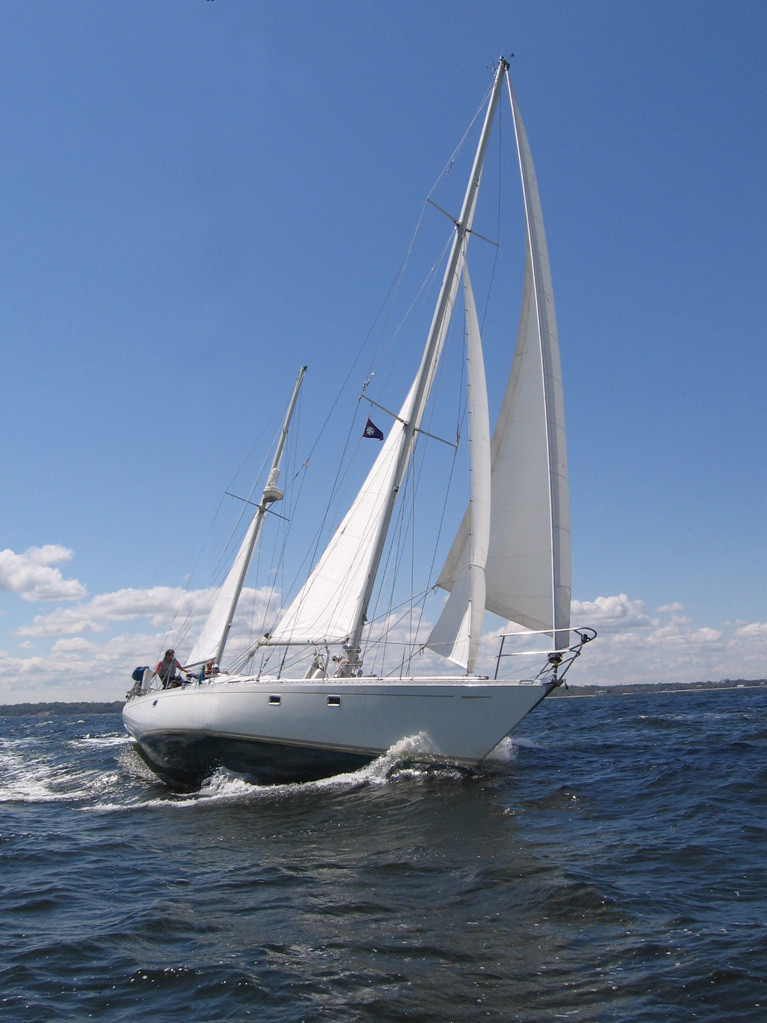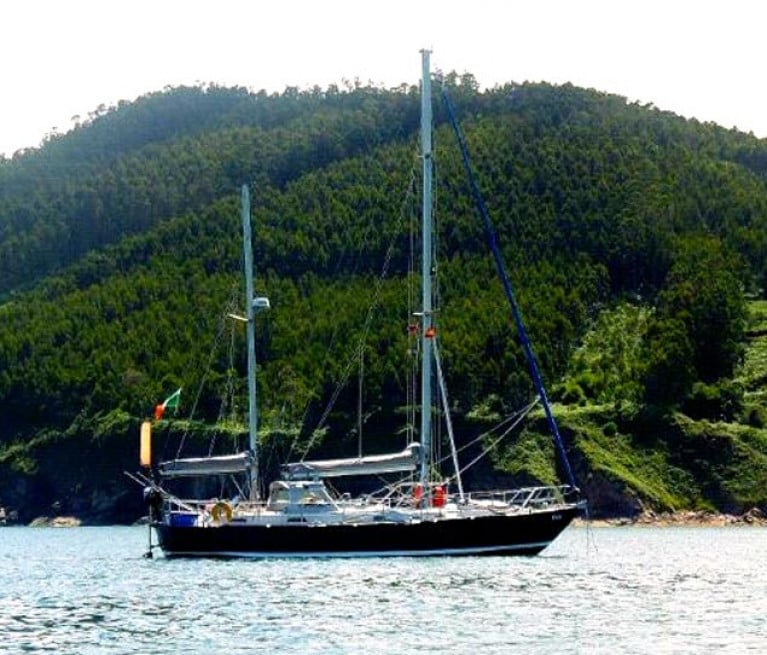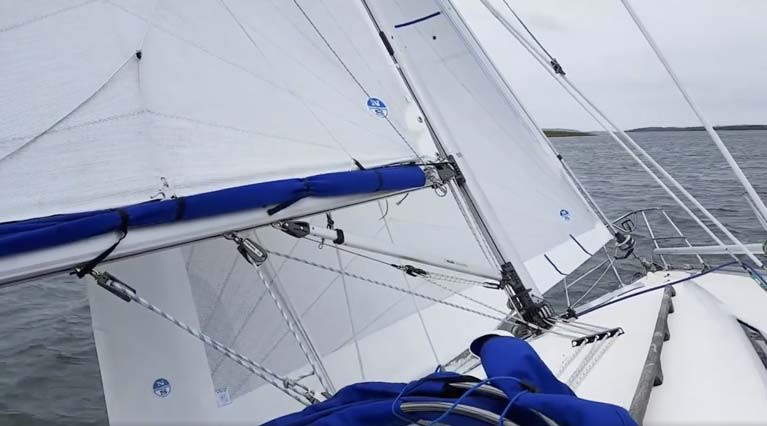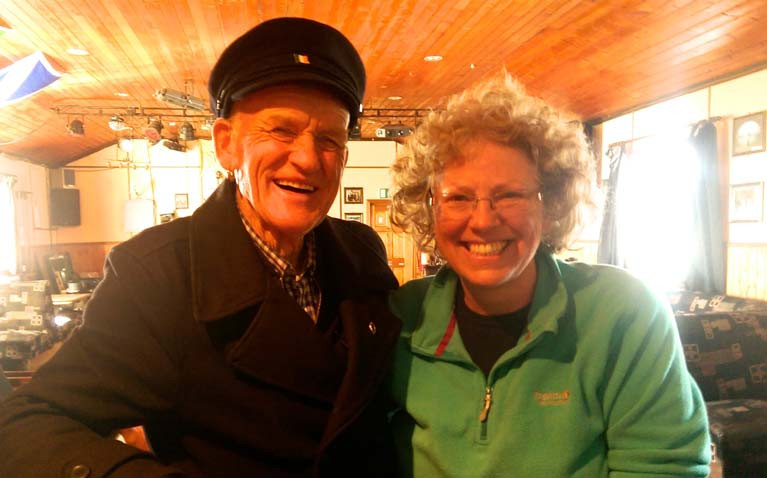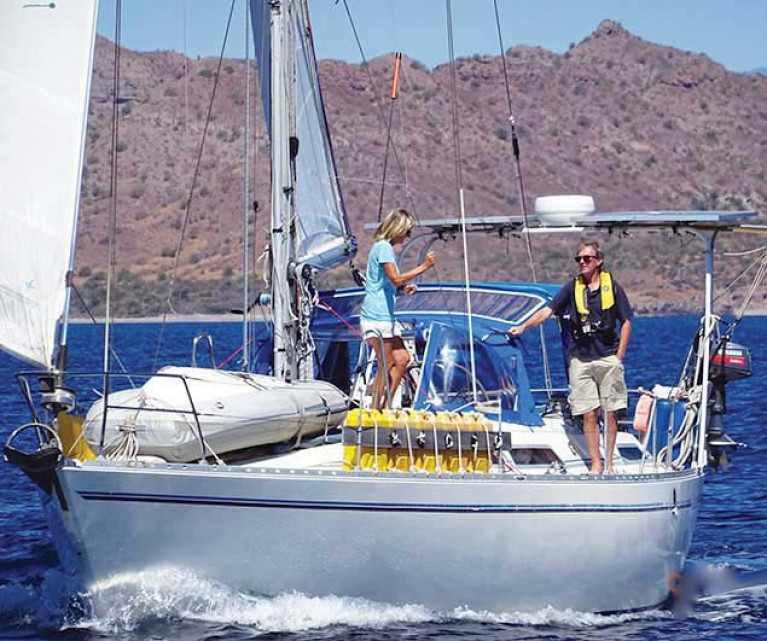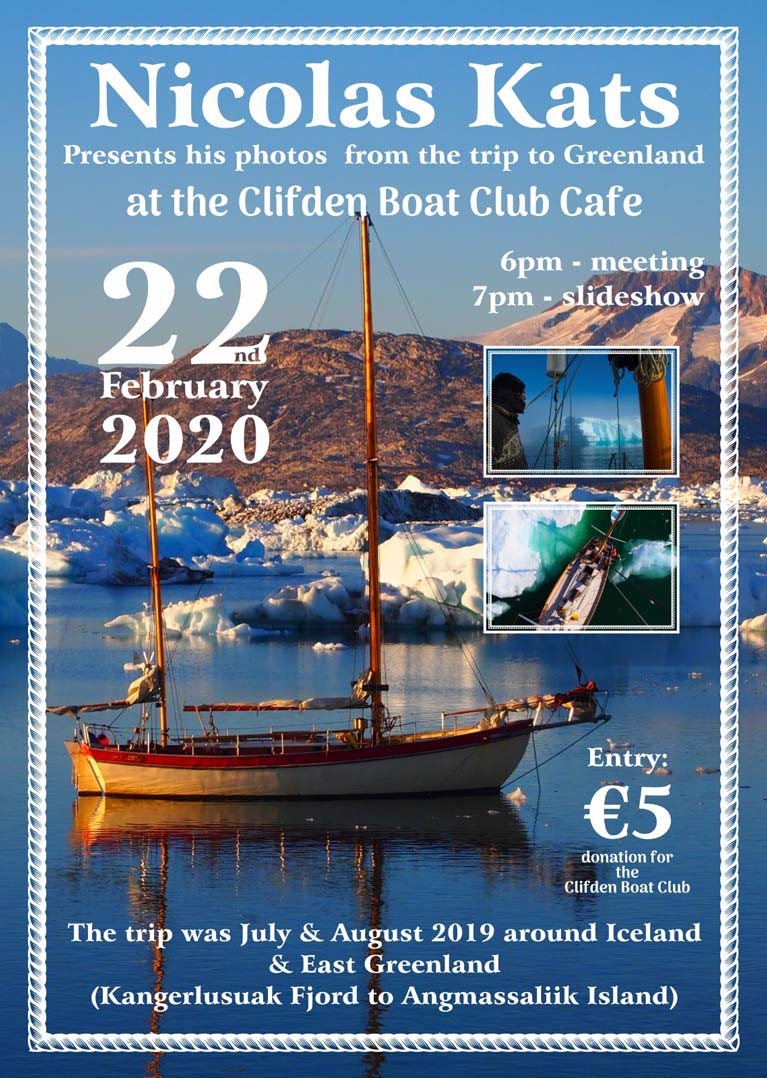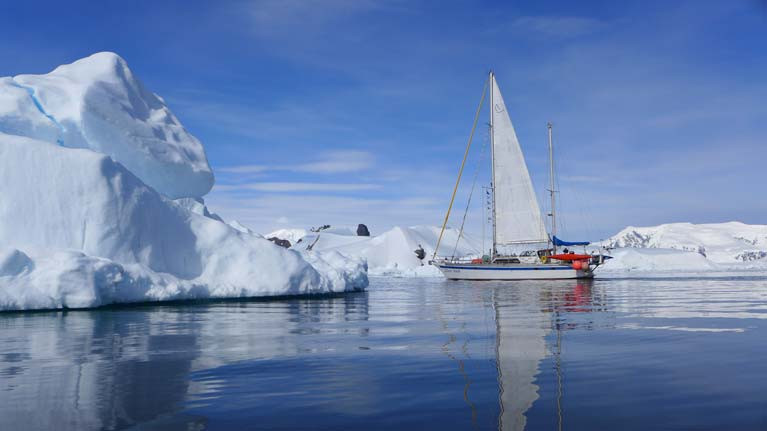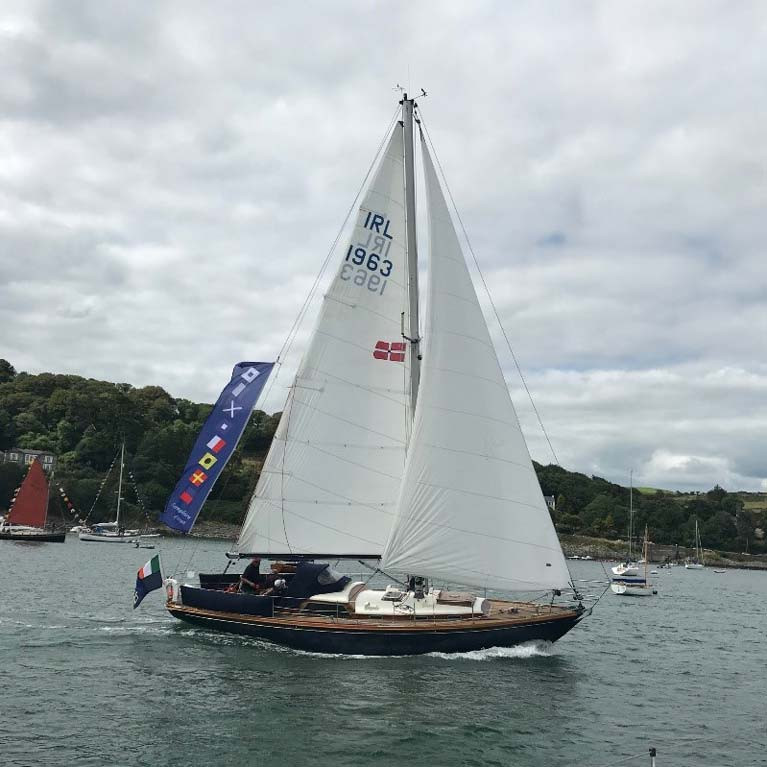Displaying items by tag: Cruising
Transatlantic Voyage Concluding at Malahide for German-Irish Family on 45-footer Saoirse
When your name is Wolfgang Bee and your boat is a top-of-the-line Hanse 455, the smart money would say you’re German. But when your wife is a Fenix from a family with roots in Tippperary and a couple of other Irish counties, and your beloved family boat is called Saoirse, then the smart money would also say that Ireland is never far from your thoughts.
Saoirse’s approaching arrival from the Azores in Ireland, with an ultimate destination in Malahide, is just one of the many voyages being tracked by the Ocean Cruising Club’s Vice Commodore Daria Blackwell from her base at Port Aleria on Clew Bay in Mayo. There, her husband Alex Blackwell (incidentally an OCC Rear Commodore, there’s a right nest of them at Port Aleria) is the whizz on the technology side as they work to provide a support service for the hundreds of OCC yachts worldwide that went off for long carefree dream cruises, but now find almost every potential port choice deeply affected by the Covid-19 restrictions.
This voluntary assistance has attracted such international attention that Daria recently found herself featuring on the Russian service of the BBC World News. And we well know that - just as the eyes of the Skibbereen Eagle used to be firmly on the doings of the Tsar of Russia - so the Kremlin is now keeping a close eye on Afloat.ie (howya Vlad, how’s it goin’, boy?), so here’s the link to show how far the OCC is reaching
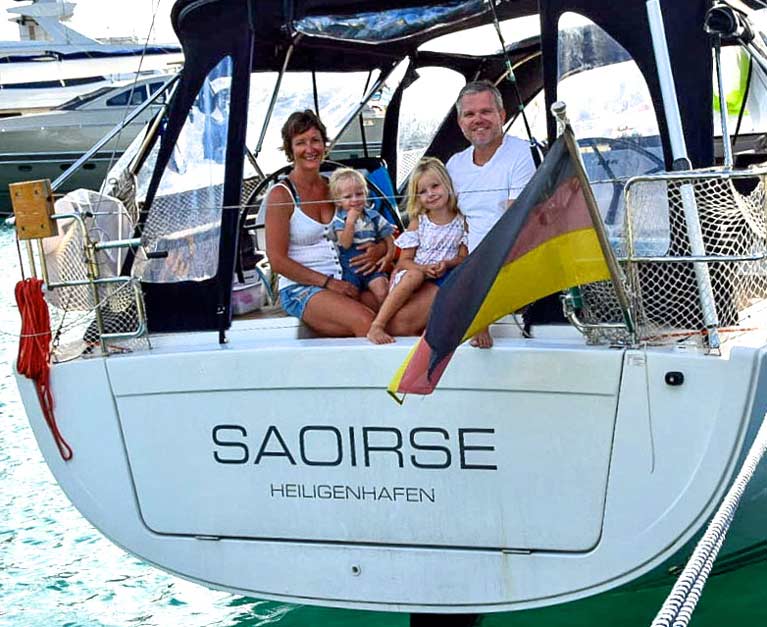 The German-Irish Bee-Fenix family on Saoirse are bound for Malahide from the Azores, where they had a restricted but very welcome five day stop in Horta after saioing from the Caribbean
The German-Irish Bee-Fenix family on Saoirse are bound for Malahide from the Azores, where they had a restricted but very welcome five day stop in Horta after saioing from the Caribbean
For boats making the almost 4,000 mile hop to Europe from the very closed-down Caribbean, the legendary hospitality of Horta in the Azores has been a godsend. And though crews arriving at Horta have not been allowed ashore, they’re provided with a sheltered berth, and ways have been devised of helping them to re-stock with stores, water, fuel and Peter’s own special Horta-distilled spirits, which will cure anything.
The Quinlan-Owens family on the Galway Bay-based 39ft ketch Danu are still in the midst of the Antigua to Horta stage, but the departure a couple of days ago from the Azores of a loose flotilla of six boats included at least two bound for Ireland, with Saoirse well-followed thanks to her regular Facebook postings However, all that is known of the other, a boat called Vibe, is that she is heading for Cork.
Time was when wandering about the oceans with only the occasional contact with anyone was what sea-voyaging escapism under sail was all about. But what with the increasing spread of AIS, and the all-involving effect of Covid-19, the crew of the good ship Vibe – which seems to lack AIS – will find themselves shaken out of their solitary little world of voyaging with something of a culture shock when they finally reach Cork
Ocean Cruising Club’s “Get-You-Home” Nerve Centre on Clew Bay Recalls Club’s Irish Links
At Port Aleria on Clew Bay in Mayo, Alex and Daria Blackwell can see their Bowman 57 ketch Aleria when she’s on her moorings off their house. But at the moment, their minds are often elsewhere, as Daria is Vice Commodore of the Ocean Cruising Club, whose many voyaging members worldwide have sometimes been finding themselves on the wrong side of local Covid-19 Lockdowns.
Helping them to plot a route home, or at least to a more friendly environment, has been entrusted to the Vice Commodore and her husband-shipmate. Thus Port Aleria has become a nerve-centre for passage planning and monitoring for a wide variety of craft from many nationalities in a large number of locations. And one of them has been Danu, the Kinvara-based 39ft steel ketch which is currently on a Transatlantic circuit cruise with Vera Quinlan, her husband Peter Owens, and their two children Lillian (12) and Ruari (10).
Their dream cruise was beginning to take on several aspects of a nightmare, as some of the Caribbean islands imposed local hyper-strict lockdowns. But the crew of Danu are a notably resourceful and good-humoured foursome, and even in situations which others might have found maddeningly frustrating, they managed to make the best of it to add to their rich store of experiences. Eventually, they found their way to Antigua, which was one of the assembly points for a flotilla of OCC boats due to leave for Europe at much the same time from several islands.
There was further frustration with a lack of wind for some days, and with the need to conserve fuel and use sail as much as possible over what might be a 4,000 mile voyage - though with the possibility of a pit stop at the Azores – patience was need until the breeze filled in. When it did, they finally got away on Saturday in company with Peter Whatley’s La Boheme. Their patience is rewarded, as Danu is currently making good progress under sail in the right direction three days after departure.
Meanwhile, ocean voyagers everywhere are either trying to do the same thing, or are watching to keep an eye on how others are doing, and a couple from Northern Ireland, Kevin & Susie Harris with the 1993 Jeanneau Sun Odyssey 47 Temptress of Down (originally Laragh based at Crosshaven), have been negotiating tricky waters as they draw towards the final stages of their global circumnavigation, which started in 2013.
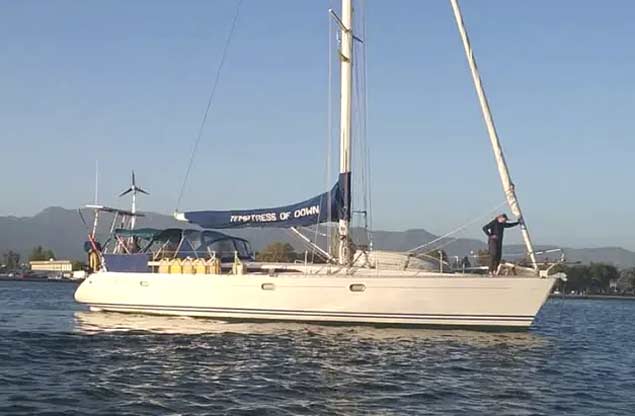 The much-travelled Sun Odyssey 47 Temptress of Down was Crosshaven-based when new in 1993.
The much-travelled Sun Odyssey 47 Temptress of Down was Crosshaven-based when new in 1993.
“Final stages” is a very relative term when you’re cruising round the world, for in the case for Temptress and her crew, it has involved how best to get from Sri Lanka into European waters. The situation in the Middle East is so volatile that the Ocean Cruising Club are reluctant to advise going there, but the prospect of the long haul down round South Africa seemed equally unappealing, so Kevin and Susie kept with their plan of simply going for it through the notoriously windy Red Sea and the Suez Canal.
From time to time, yacht convoys get formed to transit these potentially hazardous areas in the hope of finding safety in numbers. But like circumnavigators Pat and Oliva Murphy of Howth with Aldebaran in 2007, the Harrises found themselves on their own, and just went for it despite the added problems of the spread of Covid-19.
Fortune favoured the brave, and they were through the Suez Canal and into the Mediterranean by May 2nd. After replenishing stores and resting up in Crete, where they were provided with generous supplies of welcome fresh produce by the neighbourhood farmers, Temptress and her crew are now in mainland Greece at Missolonghi (yes, Byron’s Missolonghi) with the country and its minimal Coronavirus infection rate rapidly emerging from lockdown.
Meanwhile, the Ocean Cruising Club’s support network is a reminder that the club was founded in 1954 by Humphrey Barton (1900-1980), who was very active in the Irish Cruising Club when he was working in Belfast as a consulting engineer in the 1930s. He continued to maintain these ICC links, and today the OCC has a significant Irish membership, with the Vice Commodore Daria Blackwell based in Clew Bay, while the OCC Roving Rear Commodore (Baltic) is Andrew Curtain of the Royal Irish YC in Dun Laoghaire.
The OCC Atlantic Fleet are in this Wind Prediction Tracker here
Today, all being well, a flotilla of eight boats will be leaving Antigua, bound Transatlantic for Europe in the hope of being well clear of the Caribbean before the hurricane season sets in. Included in the group will be the Galway Bay 39ft ketch Danu with Marine Institute scientist Vera Quinlan, her husband Peter Owens and their two children Lillian (12) and Ruari (10).
In all, there are about 150 Ocean Cruising Club boats spread through the Caribbean, and anxious to get clear of the sometimes extreme Covid-19 lockdown in the islands. Ocean CC Vice Commodore Daria Blackwell has been much involved in advising and coordinating this movement, working from the home on the shores of Clew Bay in Mayo where she lives with husband Alex Blackwell.
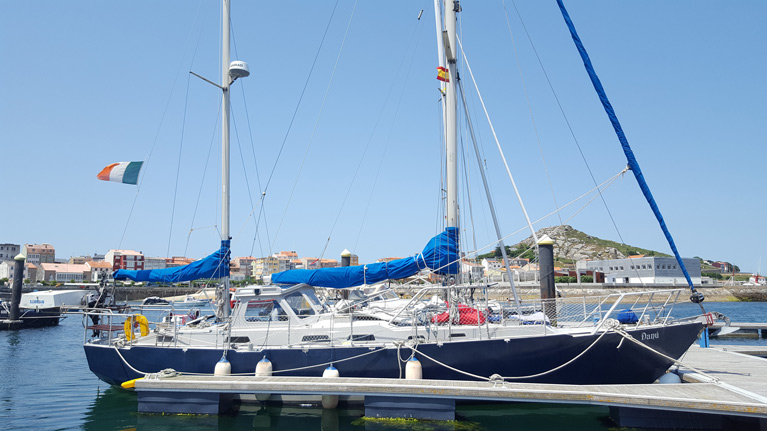 The Quinlan-Owens family’s ketch Danu hopes to depart Antigua today for the almost 4,000-mile voyage back to Ireland, possible with a brief stop at the Azores. Photo: Peter Owens
The Quinlan-Owens family’s ketch Danu hopes to depart Antigua today for the almost 4,000-mile voyage back to Ireland, possible with a brief stop at the Azores. Photo: Peter Owens
Some of the crews in the Caribbean have experienced decidedly harsh lockdown treatment at the hands of the island authorities, and while many are prepared to sail non-stop until they reach their own home waters, others are encouraged by the fact that the authorities in the Azores have indicated that they will do everything possible within their own restrictions to help the voyagers on their way.
Included among the voyaging hopefuls is Garry Crothers from Derry and Lough Swilly Yacht Club with his 43ft aluminium cruiser Kind of Blue, whose problems are particularly acute as expected crew have been unable to join him, and when he says he may have to sail single-handed, he really means it as he lost an arm in an accident some years ago.
More on this story and others in this account in the Guardian newspaper here and in this interview on the BBC World news here
The family crew of the 13 metre Bruce Roberts steel ketch Danu from Galway Bay hope to start their long Transatlantic voyage home from Antigua this weekend. The oceanic circuit cruise started nearly eleven months ago when Marine Institute scientist Vera Quinlan, her husband Peter Owens and their children Lilian (12) and Ruari (10) departed southward from Kinvara last June.
In a very competent and complete venture, they’ve savoured the total Atlantic experience on the ocean, and on both sides of it too, with detailed inland expeditions ashore – sometimes far inland – and a decidedly unusual Christmas spent up a river in South America in the heart of a dense tropical forest.
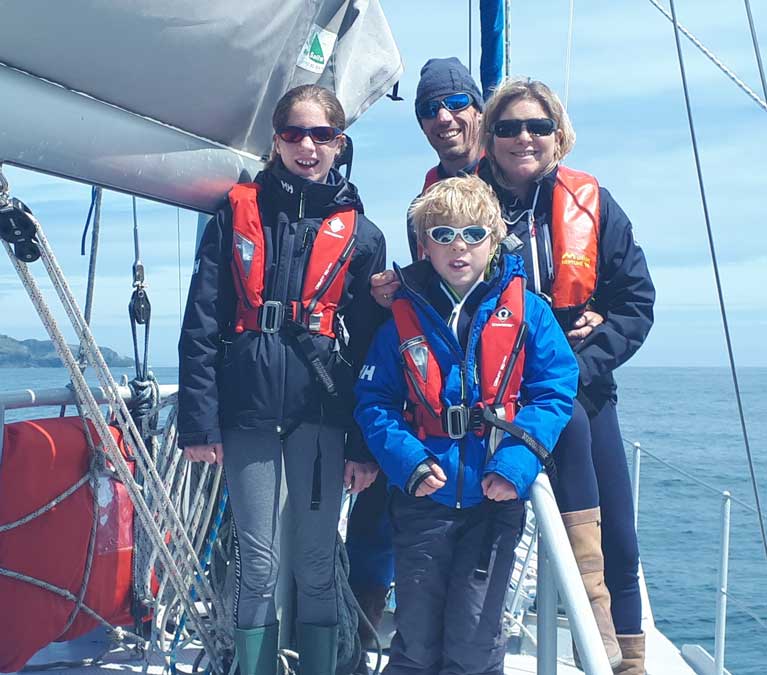 Here comes the sun…..Danu’s crew as they took their departure from Ireland at the end of June 2019, with Lilian and Ruari (foreground), and their parents Peter Owens and Vera Quinlan. Photo Vera Quinlan
Here comes the sun…..Danu’s crew as they took their departure from Ireland at the end of June 2019, with Lilian and Ruari (foreground), and their parents Peter Owens and Vera Quinlan. Photo Vera Quinlan
The reward for all this sometimes very muddy exploration was the glorious sailing northward up the islands of the Caribbean across sparkling seas, and though the increasing spread of the Covid-19 restrictions has made passage planning more complex, they have managed to modify their cruise to accommodate the new situation.
Thus when a four week lockdown was imposed, they’d got themselves to Barbuda which, as Vera reports, “is not a bad place to be stuck…..”. Since then they’ve made the 30 mile passage to Antigua where they’ve been in isolation while re-stocking the ship for the Transatlantic voyage back towards Ireland. It’s a passage which is just under 4,000 miles in all, though they hope to have a short break in the Azores if the pandemic situation has sufficiently resolved itself by that time.
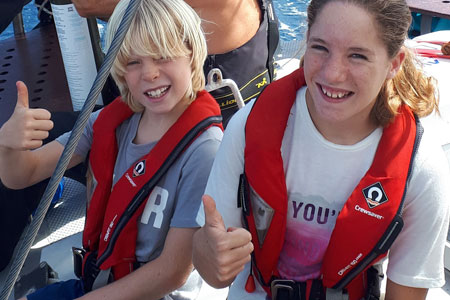 Children of the sea – Danu’s junior crew of Ruari and Lilian are with their parents in facing into a 4,000-mile voyage. Photo: Vera Quinlan
Children of the sea – Danu’s junior crew of Ruari and Lilian are with their parents in facing into a 4,000-mile voyage. Photo: Vera Quinlan
Here at North Sails Ireland, a large portion of our customer base is made up of a wide range of cruising sailors writes Maurice O'Connell.
They range from blue-water sailors who have circumnavigated the globe to coastal sailors who undertake short "hops" with friends and family.
Cruising sailors' requirements can be a little different from our "all-out" racing clients. Here at North Sails, we have an extensive range of cruising products that will deliver fast, reliable cruising for many many years.
Have you ever wondered about, "what should I be looking for in a cruising sail?". Well, here's the answer...North Sails invites all sailors to join our "10 Things To Look For In Cruising Sails" webinar.
This fun and informative webinar will be hosted by our colleagues Bob Meagher, Peter Grimm (North Sails Fort Lauderdale) and Austin Powers (North Sails Annapolis).
Read about them here:-
https://www.northsails.com/sailing/en/experts/peter-grimm-jr
https://www.northsails.com/sailing/en/experts/bob-meagher
https://www.northsails.com/sailing/en/experts/austin-powers
All are welcome to our webinar...........
With very best wishes from North Sails Ireland.
Please register here
A Complex Round Ireland Cruise Story That Draws You In
“If you find a good crew, marry her”.
It may sound flippant. But when you think of all the challenges of keeping any ship’s company in a friendly and effectively-functioning form, and add to that all the challenges of a happy marriage in these increasingly long-lived times, then that piece of crisp advice is pure gold.
Yet in the case of Richard Kennedy of Birr in County Offaly – not exactly Ireland’s most nautical town – it was Rita Hopkins of Inishowen in Donegal who introduced him to sailing, and over the years they’ve become a devoted cruising couple in every sense.
There has been an element of compromise. When Rita became Mrs Kennedy, they settled far from the sea in Birr, where Richard is a solicitor and arbitrator. But they soon had boats which they kept on nearby Lough Derg – arguably a proper inland sea – and in time became the proud owners of the characterful steel-built 34ft Bruce Roberts-designed Slocum Spray-type cutter Seachran.
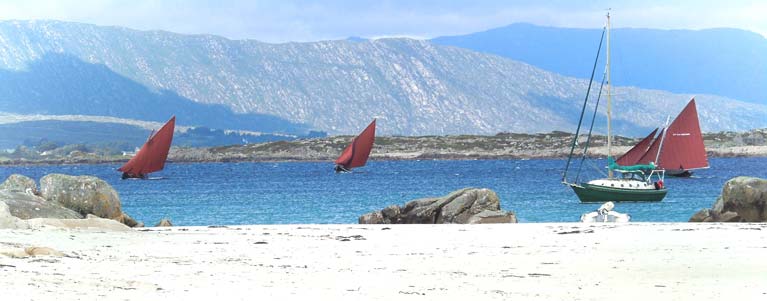 Into the west….Seachran anchored off the silver strand on Dinish in Connemara as the local hookers race in the bay. Photo: Richard Kennedy
Into the west….Seachran anchored off the silver strand on Dinish in Connemara as the local hookers race in the bay. Photo: Richard Kennedy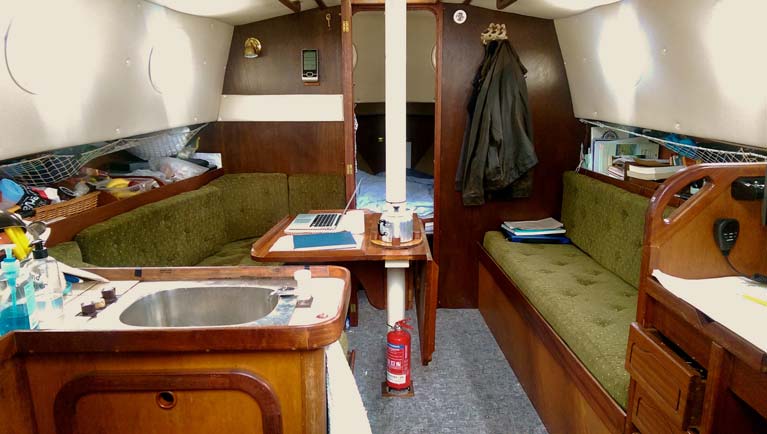 The homely comfort down below – over two seasons, Richard and Rita lived on Seachran for five months. Photo: Richard Kennedy
The homely comfort down below – over two seasons, Richard and Rita lived on Seachran for five months. Photo: Richard Kennedy
With their young sons Paul and David they had both inland and sea cruising with this boat, which had become a cherished member of the family. But with the boys growing up and making their own way in life while their parents saw retirement age approaching, the plan began to take place of Richard and Rita making a proper round Ireland cruise, with Richard maybe even writing a book about it
This will sound familiar to Afloat.ie readers, for back on September 2nd we ran this preview of the book’s launching. Many readers responded to it, and the book went into a second printing. Yet in these very peculiar times, ‘Round Ireland by Slow Boat’ really does hit the spot, and more folk should know about it.
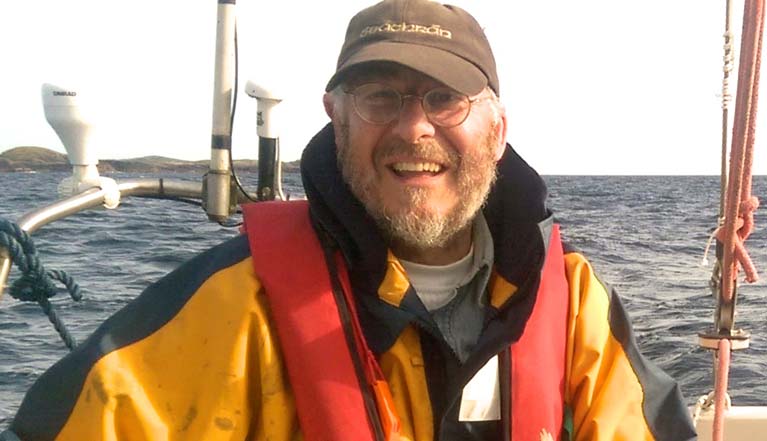 With some difficult navigation successfully completed, the skipper is in a good mood as Seacrhan approaches Inishbofin on passage from Connemara. Photo: Rita Kennedy
With some difficult navigation successfully completed, the skipper is in a good mood as Seacrhan approaches Inishbofin on passage from Connemara. Photo: Rita Kennedy
Cometh the hour, cometh the book…….This is just the kind of reading you need these days, for ultimately it’s all-absorbing escapist literature. For sure, in what became a five-month cruise spread over the two seasons of 2017 and 2018, Richard and Rita’s clockwise circuit of our extraordinary island saw them once or twice in potentially dangerous situations which Richard, with a self-deprecatory candour, admits they shouldn’t have been next or near in the first place.
Yet despite those occasional but very real hazards, you’re with them every mile of the way in a well-spiced read. For at other times when he comes upon a strange and maybe unpleasant aspect of life at some port or other, Richard is not at all backward in coming forth with an adverse opinion. Then too, their passionate interest in traditional music and other areas of Irish culture adds a dimension lacking in many cruising narratives, and through these interests, he introduces us to people well beyond the normal sailing circles.
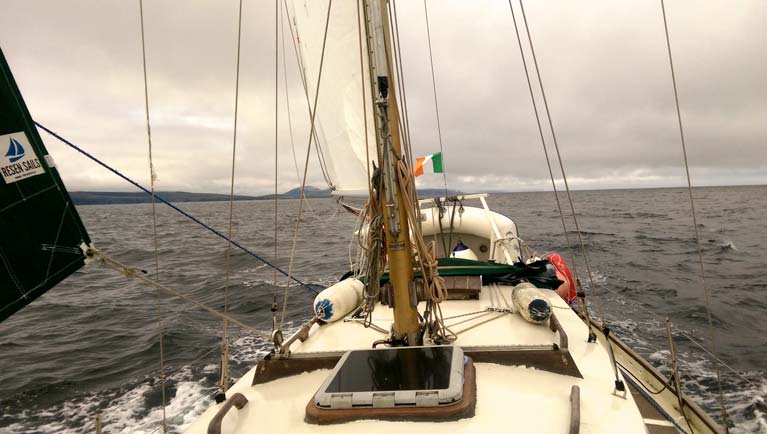 Seachran making good progress reaching along the coast of North Mayo, bound for Sligo. Note the system for self-tacking the staysail, with the sheet led upwards to a sheave in the mast. Photo: Richard Kennedy
Seachran making good progress reaching along the coast of North Mayo, bound for Sligo. Note the system for self-tacking the staysail, with the sheet led upwards to a sheave in the mast. Photo: Richard Kennedy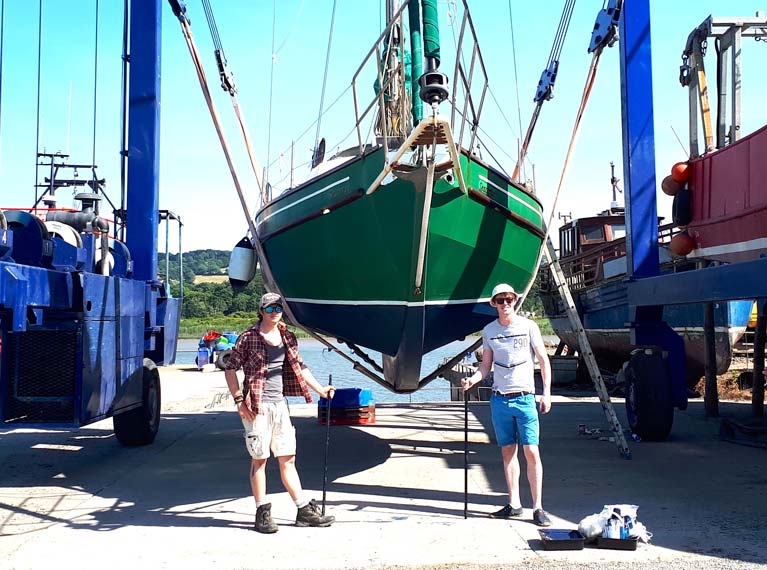 With the help of family and friends, Seachran was given a fresh coat of anti-fouling in record time at mid-voyage in the boatyard at New Ross in County Wexford. Photo: Richard Kennedy
With the help of family and friends, Seachran was given a fresh coat of anti-fouling in record time at mid-voyage in the boatyard at New Ross in County Wexford. Photo: Richard Kennedy
In time, this special two-season cruise takes on such a strong character of its own that neither the participants nor the reader want it to end. I was reading it at the same time as another longtime cruising shipmate, and as we both neared the ultimately successful conclusion with Seachran back in her home port of Kilgarvan on Lough Derg, we found ourselves exchanging emails about how we were reading it in ever-shorter segments, as it so perfectly removed us from the unimaginable realities of life today.
The core of it all is the clearly very special relationship between Richard and Rita. It’s not impertinent to suggest that in the final analysis, ‘Round Ireland by Slow Boat” is a love story and a refreshingly self-aware one at that. It will do you a world of good to read it in it entirety.
Published by Throughthechair Publishing, it’s on sale for €15 including post and package, details at roundirelandbyslowboat.net, or contact Richard Kennedy direct at [email protected]
As for what Richard and Rita might do next? The cruise has been successfully completed. The book has been written and well received. So now they might get together with their seisiun friends in those special little pubs close under the Slieve Blooms, and compose some music of the voyage.
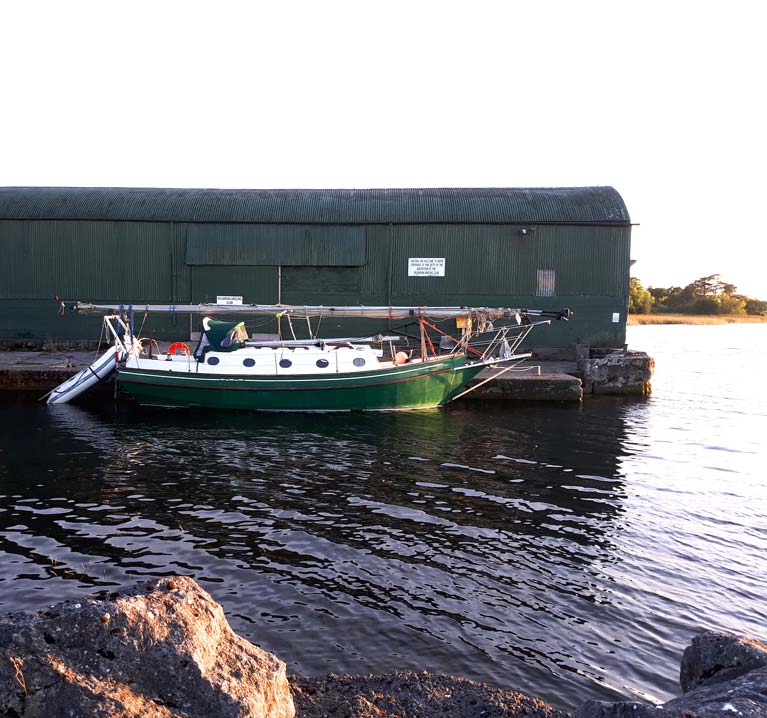 Home again. Her mast having been lowered to negotiate the bridges of Limerick, Seachran has gently made her way under auxiliary engine (a marinised Volkswagen Golf diesel) back to her hidden home port of Kilgarvan on Lough Derg. Photo: Richard Kennedy
Home again. Her mast having been lowered to negotiate the bridges of Limerick, Seachran has gently made her way under auxiliary engine (a marinised Volkswagen Golf diesel) back to her hidden home port of Kilgarvan on Lough Derg. Photo: Richard Kennedy
Daragh Nagle is February “Sailor of the Month” (Cruising)
The worldwide spread of the Irish Cruising Club membership was in evidence at the AGM in Dun Laoghaire at the end of February when Daragh Nagle was awarded the supreme trophy, the Faulkner Cup.
Originally of Portmarnock but now cruising from Victoria in British Columbia with his wife Cathy O’Neill in their 1987-vintage Moody 376 Chantey V, Daragh’s 2019 venture was a properly-logged 2,500 miles-plus 90 day venture with more than 70 ports and anchorages visited, competently dealing with a mixture of extreme tides and open sea passages in exemplary style.
Arctic Cruising Comes to the Warmth of Clifden on Saturday night
The further west you go in Ireland, the warmer is the hospitality. So despite the current ferocious weather and the fact that Clifden in Connemara is well out into Ireland’s Atlantic frontier, the mood will be friendly and warm in Clifden Boat Club this Saturday night as Commodore Donal O Scannell welcomes members and guests for American skipper Nick Kats’s profusely-illustrated unveiling of his recent Arctic voyaging with his hefty Danish steel-built Bermuda-rigged 39ft ketch Teddy.
It is quite a few years since Nick and Teddy arrived into Clifden for a visit of undefined length, and during that time he has built up a reputation in Connemara for his skills as an acupuncturist and naturopathic doctor. But a return to his home in Oregon by way of the Northwest Passage was always on the horizon. However, it slipped down the agenda as he made exploratory visits to Greenland waters, and became bewitched by the place.
Thus last year’s cruise to the north was clearly made with no intention of trying for the Northwest Passage at all, as it took him to Eastern Greenland and included a circuit of Iceland before returning to Clifden. Just like that. It’s all very remarkable, and if you’re looking for something truly different in Connemara this Saturday night, we strongly recommend a visit to Clifden Boat Club for a unique experience.
Irish Sailing’s Cruising Conference at National Yacht Club Provides Inspiring Visions of Far Horizons
The annual Irish Sailing Cruising Conference attracted a capacity attendance of a hundred enthusiasts to the hospitable National Yacht Club on Saturday, with an excellent and sustaining club lunch at mid-conference to provide further energy for a very busy programme, and also offset any thoughts of Storm Dennis starting to manifest himself outside.
For in the warmth of the clubhouse and the camaraderie of sailing the sea, organiser Gail McAllister and her team had provided a lengthy yet absorbing schedule of presentations which covered a huge variety of topics, going beyond the basic theme of Exploration and Discovery.
Thus while everyone knew that contacts with Damian Foxall, Lucy Hunt and Niall McAllister in Antarctica with the expedition yacht Ocean Tramp were coming down the line, as were links with Vera Quinlan and her family cruising the Caribbean, while voyager/explorer Jamie Young of Galway was there to tell his story and outline several interesting news ideas, the reality is that cruises long and short involve dealing with the behaviour of waves at sea, and that was the opening topic.
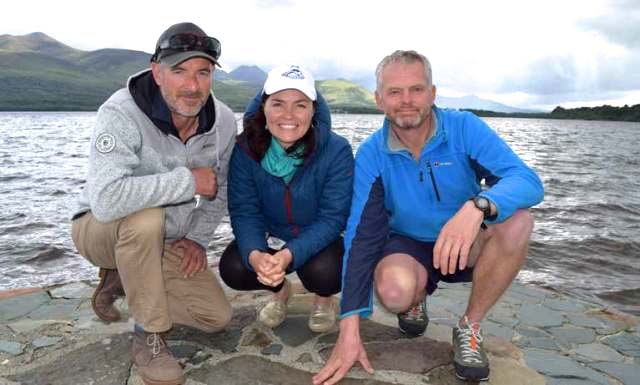 Irish Sailing Sustainability Ambassador Damian Foxall with shipmates Lucy Hunt and Niall McAllister
Irish Sailing Sustainability Ambassador Damian Foxall with shipmates Lucy Hunt and Niall McAllister
It sounds like a technically specialist area, yet Met Eireann’s Sarah Gallagher not only made it very accessible, but gave everyone her direct email contact for further information on a topic which every helmsman knows as having almost infinite permutations.
Next up was Jim Wilson of Ballinacurra in East Cork, birthplace in 1785 of seafarer Edward Bransfield, the discoverer of the Antarctic landmass in 1820. With the Bicentenary of his great breakthrough upon us, we find that it has taken 200 years for Bransfield to become an overnight success, but the awareness of what he achieved is gathering pace, largely thanks to the infectious enthusiasm of Jim Wilson and his group, and he made a fine job of making it an entertaining topic.
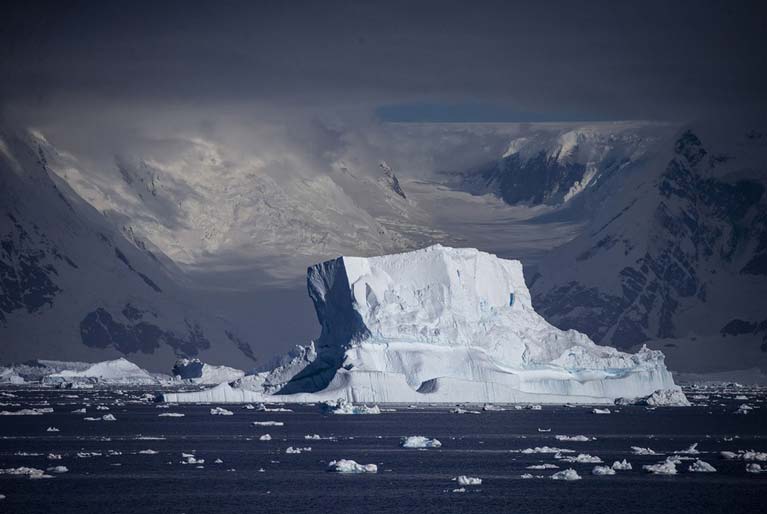 Antarctica in all its magic and mystery – the discovery of the Antarctic landmass 200 years ago by Edward Bransfield of Ballinacurra, East Cork, was one of the many topics covered at Saturday’s conference.
Antarctica in all its magic and mystery – the discovery of the Antarctic landmass 200 years ago by Edward Bransfield of Ballinacurra, East Cork, was one of the many topics covered at Saturday’s conference.
With an admittedly northern part of the Antarctic landmass very briefly achieving a temperature of 20 degrees recently to provide a new record high for the region, the ice melt is a global problem. But there’s still an awful lot of it about, and the distant word from the crew of Damian Foxall (Irish Sailing’s Sustainability Ambassador) from Ocean Tramp is that while Climate Change is one of their major interests, an Antarctic storm is still way beyond most people’s cruising experience, and the access voyage southward across the Drake Passage from Cape Horn can be epic.
While Jamie Young is best-known in sailing circles for his remarkable Greenland voyages with the alloy-built Frers 49 Killary Flyer (we’d put good money on him to be the first yacht skipper from Ireland to get round Greenland), he is no stranger to the Southern Hemisphere, indeed he once went round Cape Horn in a kayak, as one does….
However, while Greenland voyaging is his shtick these days, he is determined to see Climate Change being combatted by much-increased use of sail power, and has developed some advanced ideas – some of which he revealed at the conference - about how best to do that in special smaller cargo vessels where developments in sail handling techniques for racing machines and superyachts can be usefully adapted to be of real commercial value to mankind.
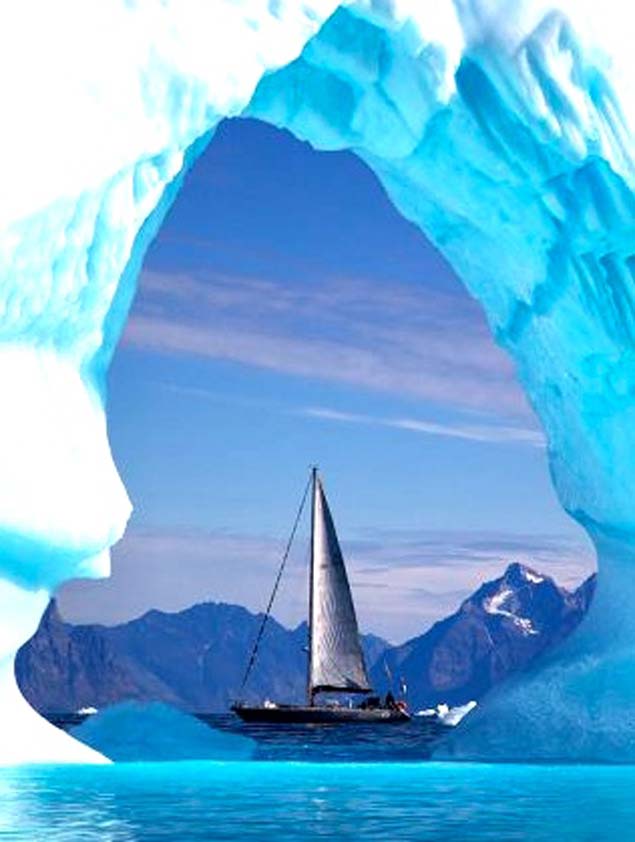 Melting icebergs in the Arctic can be dangerous for near approach, but one of them does provide a very special frame for a portrait of Jamie Young’s Frers 49 exploration yacht Killary Flyer from Ireland's west coast
Melting icebergs in the Arctic can be dangerous for near approach, but one of them does provide a very special frame for a portrait of Jamie Young’s Frers 49 exploration yacht Killary Flyer from Ireland's west coast
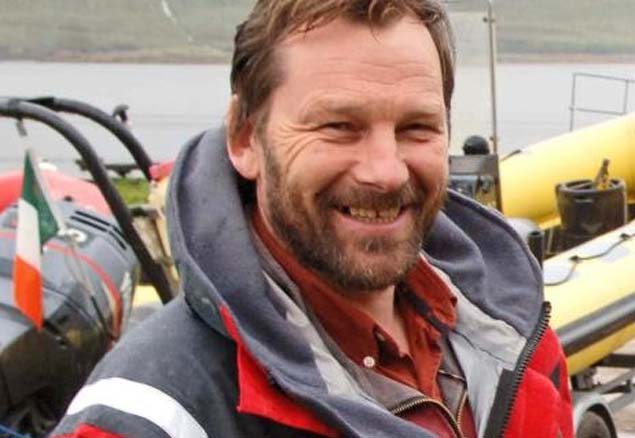 Jamie Young outlined his plans for developing viable sail-driven commercial freight and trading vessels
Jamie Young outlined his plans for developing viable sail-driven commercial freight and trading vessels
After lunch, the re-introduction to seafaring was provided by Dun Laoghaire voyager Christine Heath, whose extended cruises with her Limerick-built Shipman 28 Gusto were summed up in the title of the presentation: “From Dun Laoghaire to Kilrush via the Baltic”. Her boat is now “nesting” in Kilrush Marina, and this summer she plans cruising on Ireland’s western seaboard in detail.
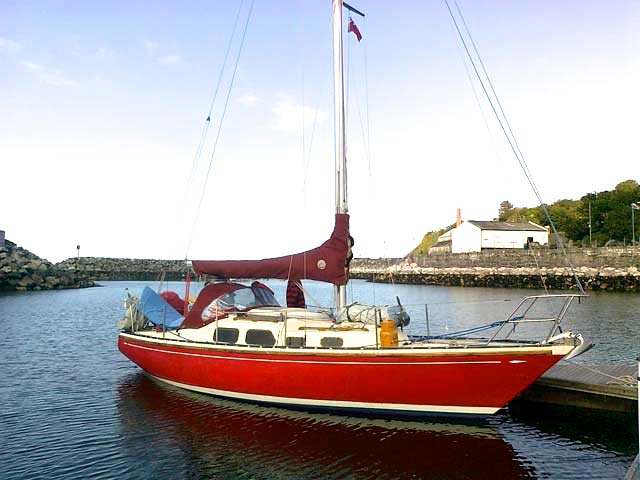 Christine Heath’s much-travelled and immaculately-maintained Shipman 28 Gusto
Christine Heath’s much-travelled and immaculately-maintained Shipman 28 Gusto
It was a cruising family from that same Atlantic seaboard who were next on the agenda, but their current focus is on the other side of the ocean. For, as recounted in detail on Afloat.ie recently, Vera Quinlan of Kinvara and her family with the 13m ketch Danu are on a 15-month Atlantic circuit cruise, and as she is a hydrographer by profession, her insights into voyaging and the state of our seas carry real weight.
Carrying weights of a small but significant size was the busy agenda’s next subject, with Toni O’Leary of Union Chandlery providing her expert information and advice on galvanic corrosion and its countering by anodes - definitely a specialist subject, yet one about which every sailor and particularly every cruising person needs to be well aware.
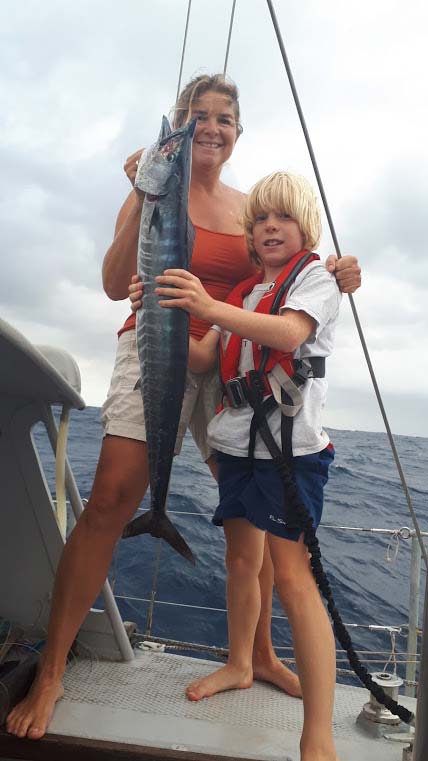 The family ocean cruising dream fulfilled - Vera Quinlan and son Ruari aboard Danu in mid-Atlantic
The family ocean cruising dream fulfilled - Vera Quinlan and son Ruari aboard Danu in mid-Atlantic
After the underwater detail of cruising boat maintenance, it was time for a breath of fresh air and visions of sunlit cruising grounds and favourite anchorages. A new angle was provided on this by Norman Kean of Courtmacsherry, Honorary Editor of the Irish Cruising Club Sailing Directions. With his wife Geraldine Hennigan, Norman has recently seen through the publication of the latest edition – the 15th – of the ICC’s book for the South & West Coasts, and much use is made of his untiring enthusiasm for using drone photography, which meant that at the Conference he was able to run an informal competition, showing new aerial photos of choice anchorages and asking people to tell him where it was.
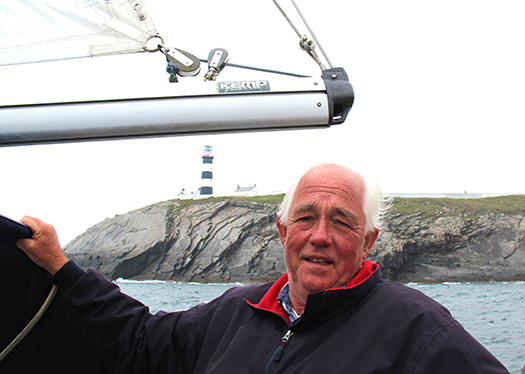 Two heads are better than one……coastal drone photography ace Norman Kean at the Old Head of Kinsale
Two heads are better than one……coastal drone photography ace Norman Kean at the Old Head of Kinsale
Inevitably the usual discussions of varying intensity broke out about the best cruising anchorage of all (everyone has a favourite), but Norman then reintroduced a more businesslike mood with an outline of another of his specialities, the realities of the marine diesel situation and accessing fuel on the Irish coast, which can be problematic, to say the least.
However, cruising goes on even with such hassles to be overcome, and there was close interest in Vincent Lundy’s outlining of the Cruising Association of Ireland’s plans for 2020, which will include a Cruise-in-Company to Scotland.
As for the major happening in Ireland this year, the Tricentenary of the Royal Cork Yacht Club, Mike Rider - Rear Admiral (Cruising) of the RCYC - was on hand to tell this focused group of total cruising folk of how best they could avail of the various events on offer in order to join the party, while at the same time staying within the cherished preferences of the true cruising spirit.
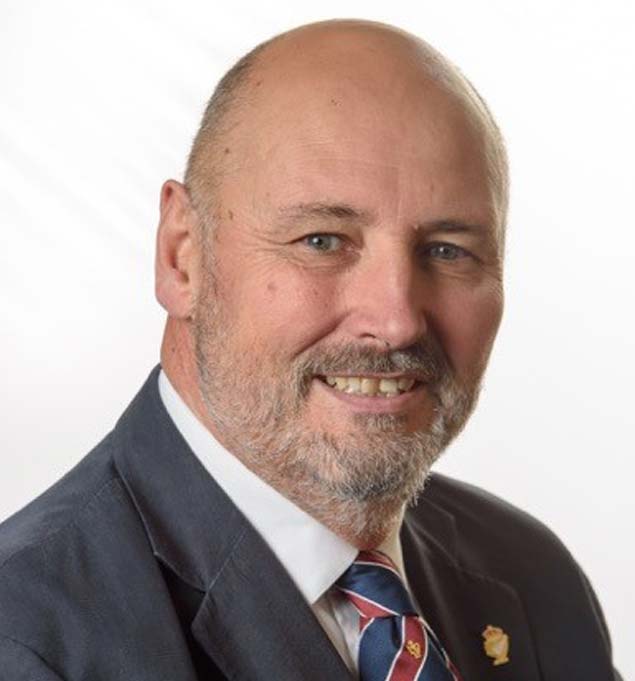 Mike Rider, Rear Admiral (Cruising) Royal Cork Yacht Club
Mike Rider, Rear Admiral (Cruising) Royal Cork Yacht Club
This special and successful gathering concluded with the news that 2021’s Conference will be staged in Cork in February on a “non-Rugby weekend”, with venue still to be finalised. But while using the National Yacht Club for this memorable 2020 get-together inevitably limited participating numbers to a hundred, it has set a standard of quality, interest, information and enjoyment which will be quite something to match.
Cruising the Nicholson 36 'Samphire' from Ireland to the Hebrides
Royal St George Yacht Club's Frank O'Beirne won the Irish Cruising Club's (ICC) Perry Greer Bowl for the 'Best First ICC Log' that describes a cruise from Dun Laoghaire to the Hebrides last Summer, a voyage that has provided the impetus for a proposed cruise to Rockall via Reykjavik this season
In 2017, our third year of ownership we took Samphire around Ireland and on passing through the North Channel, looked wistfully at Scotland and vowed to come back next year and cruise the Hebrides. And so it came to pass. It was to be Scotland this year.
Winter planning and noodling about on Navionics resulted in a ludicrously ambitious plan to get as far as Stornoway, perhaps taking in Rockall on the way home via Reykjavik. Sense finally prevailed and with families and jobs to keep going, Skye was set as the target. A pleasant stay in Ballycastle during the previous year's circumnavigation gave us an excuse to return on a short cruise in early June so that we were positioned there as a jump-off point to make the most of our time. The trip up to Ballycastle for Kieron, his brother Declan and I, via Ardglass and Glenarm, was eventful if only for the characters we met in both locations, being guided to the 'right' pubs and mixing it with the local marching band…but that's another story.
"bouncing around in a 1964 36-footer in variable Scottish weather was a hard sell"
The end of the Leaving Cert for our two girls Helen and Grace was the perfect excuse to press-gang them and their mum, Judy, into accompanying me on the first leg of the cruise. I'll admit, potentially bouncing around in a 1964 36-footer in variable Scottish weather was a hard sell, but a promise to tone down the parental warnings regarding an upcoming Magaluf trip eased the path, and we walked from home to the Dart station and onto the boat in Ballycastle a few hours later via bus, train and taxi.
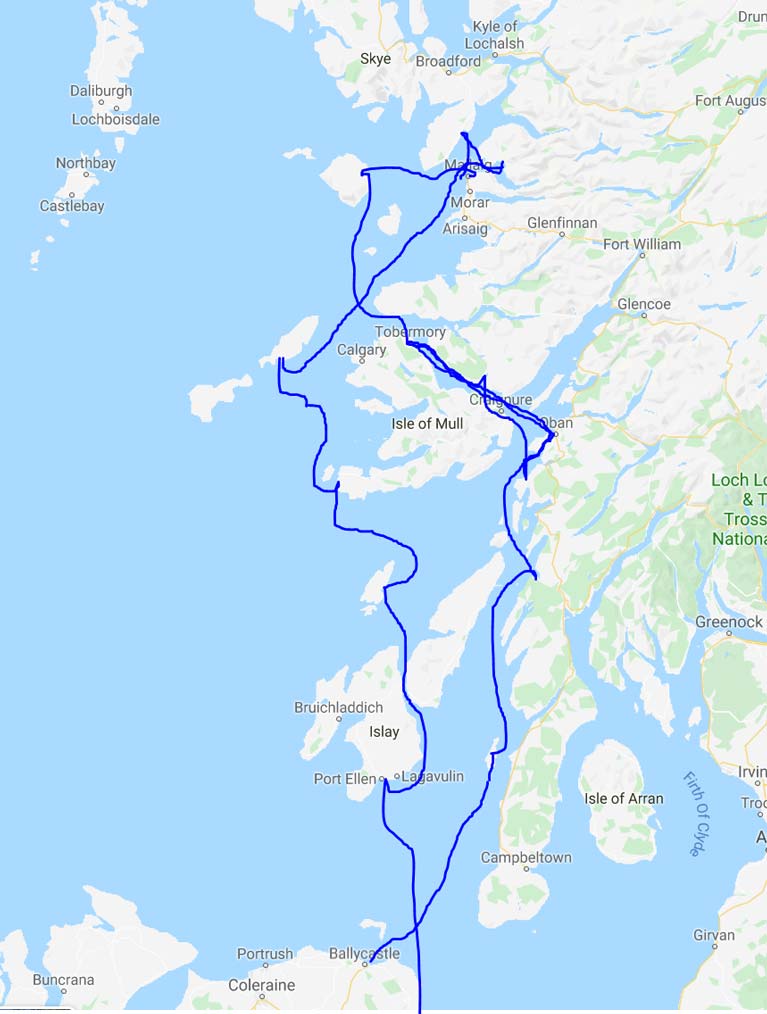 Samphire's Hebrides route
Samphire's Hebrides route
A following southwest breeze, 8-12 kts, zero cloud cover and flat seas are the best way to sail to Gigha – it has a lot going for it. The skipper did not allow enough time to catch the last of the east-going flood between Fair Head and Ratlin, and we lost some time punching a west-going current which turns early inshore. A half-hour late departure made all the difference. Lesson learned; missing tides up thereabouts guarantees a long day.
Gigha's new breakwater and pontoon, along with the attractions of the Boathouse restaurant its own sub-tropical micro-climate and Achamore Gardens make this a destination in itself. As the islanders have bought out the landlord through a vehicle called the Isle of Gigha Heritage Trust, the improvement is evident everywhere. We bumped into ICC members Peter and Rosemary Bullick on their way back from an extended cruise to the Outer Hebrides. Two days later we set out up the Sound of Jura with spinnaker set and chilled out. One of the great things about cruising with teenagers is you get to hear all the new hit tunes…ALL of them. I developed temporary tinnitus.
Next stop Crinan, for supplies a shower and the 6.5km walk which is the Crinan Trail. All this stunning scenery, rounded off with coffee and carrot cake at the key-side café while watching the antics of just-in-control crews pass through the lock gates. We think of 'cool' as the exclusive domain of the young. However having watched the older couple let the bustlers go ahead of them, ease into the lock, slip warps onto the bollards with minimum fuss while conversing pleasantly with the lock keeper, I'd beg to differ. This pair were the epitome of cool….in an off-beat sort of way.
Passage through the Sound of Luing was a sleigh-ride with a north going tide. We were shocked to see what appeared to be a periscope approaching at speed. Sure enough, the chart said 'submarine exercise area' so we took evasive action and gybed onto starboard. As we sped past, the periscope turned out to be a semi-submerged lobster pot set in 5kts of tide complete with rooster tail. Another lesson learned; use the darned binoculars. Past the impressive Fladda rocks, up the Sound of Nish, through Kerrera Sound and onto the pontoon in Oban. A big day out but great sailing.
"Another lesson learned; use the darned binoculars"
As a new member to ICC, I am impressed with all the fine dining that appears to go on. Oban, by Rick Stein's assessment, boasts 'the best fish and chips I've ever tasted' at the Oban Fish and Chip Shop. Not a fancy joint, décor includes white tiled walls and floor, condiments are mainly of the ketchup, salt and vinegar type…..but the cod and chips! Michelin stars are not generally handed out to chippies, but if they are, this is the place.
Off to Tobermory next in company with ferries, superyachts and trawlers. Arrival here was the highlight of Helen's trip who remembers the BBC children's programme starring Katie Morag. We played 'what's the story in Ballimory' on the speakers for her arrival. Nostalgia is alive and well. Robert Hemming is a welcoming Harbour Master and the facilities at Taigh Solais, the harbour building, are as good as you can get.
Taking a few days to enjoy the setting included a memorable swim under the Aros Waterfall. This is not for the faint-hearted or cold-blooded but well worth it if only for the getting out afterwards. The 88m superyacht Infinity was anchored off but didn't invite us on board for a sundowner — their loss.
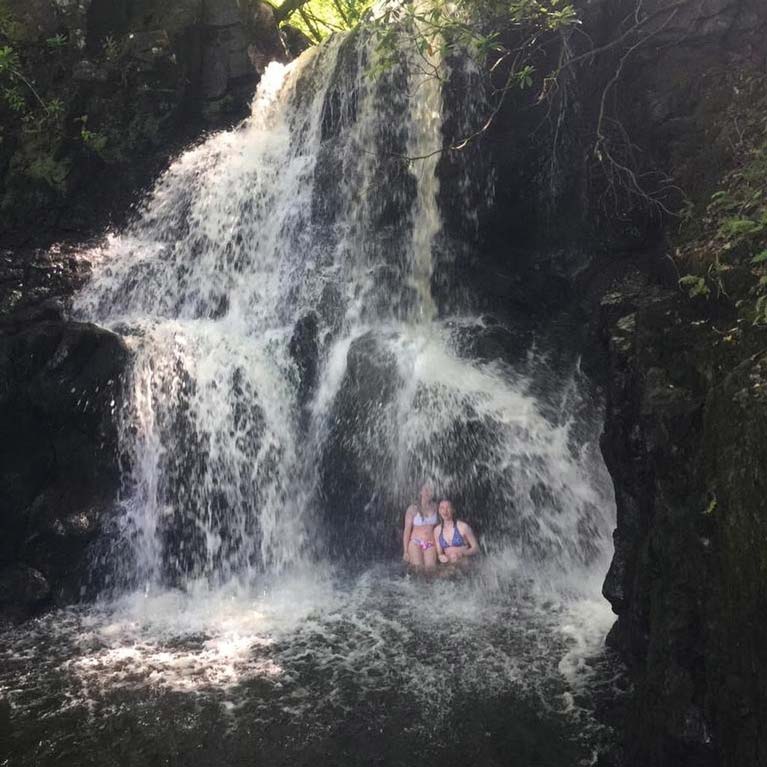 Cooling down in the Aros waterfalls at Tobermory
Cooling down in the Aros waterfalls at Tobermory
Judy brought me across the harbour in the dinghy for a long swim back across what we thought was a very shallow bottom. On inspection, we were looking down into water clogged with jellyfish as far as the eye could see. Not sure what environmental phenomenon caused this but I could have nearly walked home on jellyfish and kept my feet dry. We beat a hasty retreat for a sunset G&T.
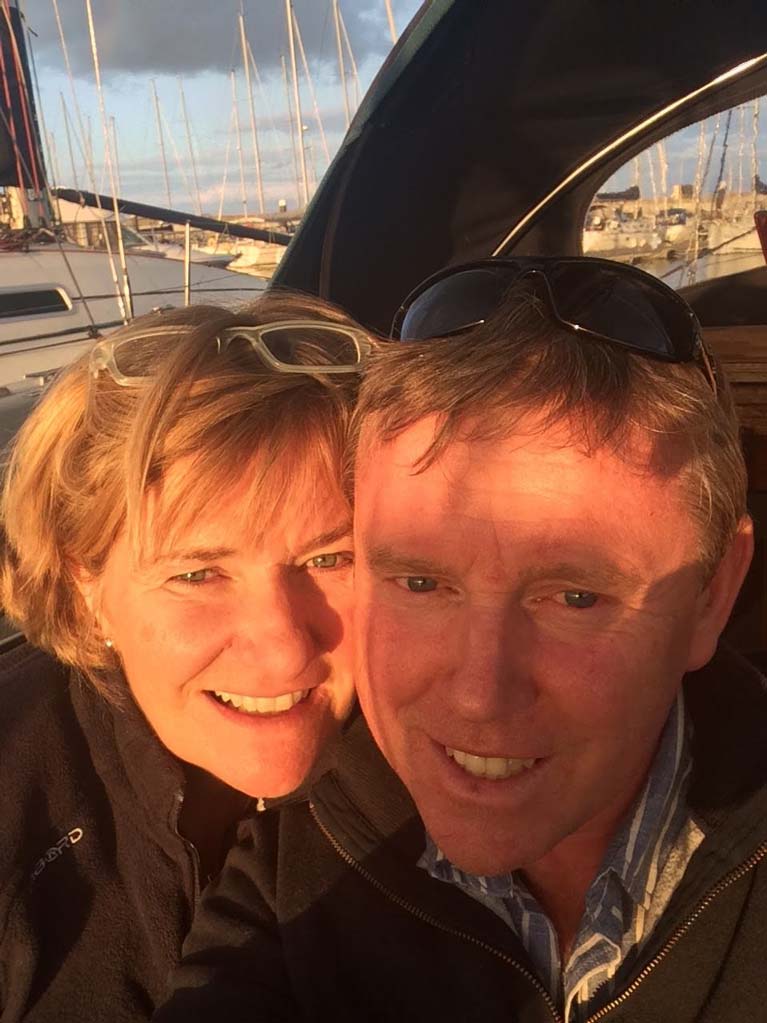 Judy and Frank
Judy and Frank
The girls' time had come to an end, and Magaluf beckoned. I couldn't compete with this so sent them off on the bus where, through a combination of trains, planes and automobiles they arrived back later that day at our local Dart station for the short walk home. Tobermory & Oban are places to be recommended for a crew change.
A blissful two-day solo sailing period ensued which included a stop off at Loch Aline and then Puilladobhrain. The obligatory hike over the headland for (several) beers in Tigh An Truish opposite the Bridge Across the Atlantic had me in company with Kirsty and Donald (whom else when in Scotland?). Two locals with a severe sense of craic about them.
A very sluggish start the next day got me to Oban again to pick up the incoming crew in the guise of Kieron Guilfoyle my co-owner, Chris Arrowsmith and Adrian Eggers. A quick pitstop for supplies and we were away again for Tobermory in the company of sailors in the annual Round Mull Race. Although not entered, we managed to get a hooter as we crossed the line – a great days' racing'. This race is quite a thing here and goes on over three days with a shindig in a different port every evening.
Up and away the next day to see what Rum, Eigg and Muck had in store. We vowed to return to Rum at some stage when we saw the magnificent scenery and potential for walking as we dropped the hook in about five fathoms 100m off the slipway. We were intent on visiting Kinloch Castle, a late Victorian mansion built as a private residence for Sir George Bullough, a textile tycoon from Lancashire whose father bought Rum as his summer residence and shooting estate. It was the last word in opulence and one of the first to have electricity fed by its hydroelectric dam. Alas, the weather Gods turned against us, and we didn't fancy the egg-beater of an outboard on the dinghy, making it ashore and back. Hence, we spent a profitable evening on the hook inspecting a perfect bottle of gin, sorting out world politics and singing badly.
"we spent a profitable evening on the hook inspecting a perfect bottle of gin"
The heavy weather continued the next day, so we cleared out and had a decidedly lively broad reach in 25-30 kts to Malaig. The marina there is well run, and the town has one of everything. What we didn't anticipate was the arrival of the Hogwarts Express into Mallaig station. Passing through stunning scenery, it runs the 41kms to Fort William passing over the famous Glenfinnan viaduct which features in the Harry Potter movie. We just needed more time to do all the things we wanted to do….perhaps another time. We settled for a hike over hills behind the town to give some stunning views of the Highlands.
Next up was Skye across the Sound of Sleat. We had hoped to cruise the southwest coast of Skye taking in Scavaig and maybe Canna but some heavy weather had closed in and time was running out. We did, however, tick the Skye box by calling in at the delightful Ornsay harbour for a swim, lunch and a pint. We then beat back southwards, bypassing Lough Hourn and into Lough Nevis to The Old Forge gastro pub at the foot of Knoydart in Inverie. With no roads in or out, an 18-mile hike over Munros or a 7-mile sea crossing, the pub claims to be the remotest on mainland Britain (verified by the Guinness Book of Records). The seafood here is excellent and worth the bumpy ride to the complimentary mooring afterwards.
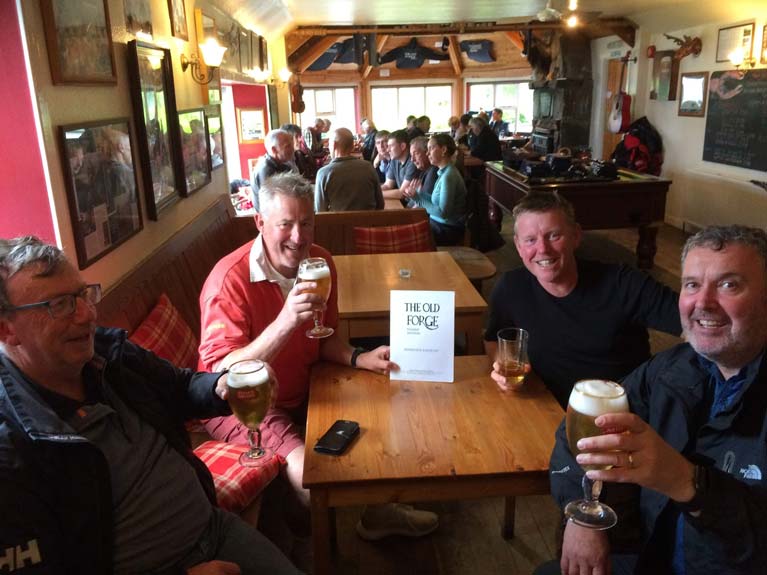 Drinks at The Old Forge Inn for (from left) Chris, Adrian, Frank and Kieran
Drinks at The Old Forge Inn for (from left) Chris, Adrian, Frank and Kieran
It is hard to capture the essence of the scenery here, the ruggedness and raw beauty. The steep loch shores fall straight into the sea, the peaks are jagged and, gnarly and everywhere you look, you are overwhelmed by the beauty of the place.
It was time to start heading south again, and we set course for the 38nm leg to Coll. Anticipating an upwind slog, we settled down for the day in damp, blustery conditions. We got a break though as we pulled level with Arisaig sound and the wind veered 30 degrees giving us a fetch in relatively flat water – Samphire's favourite point of sailing. This was meant to be both a sailing and walking holiday, so we felt obliged to do at least something by way of exercise and tramped across the island to swim on a beach on the west coast of Coll. Again, not a swim for anyone who enjoys heated pools, but it built up a great thirst which we attended to in the Coll Hotel with a memorable dinner thrown in.
For me, the next destination was one I was looking forward to most – the Treshnish Isles with its puffins. If you haven't seen one of these funny little guys up close, I commend them to you. The Island of Lunga has one of the most spectacular colonies of puffins which nests there April-August.
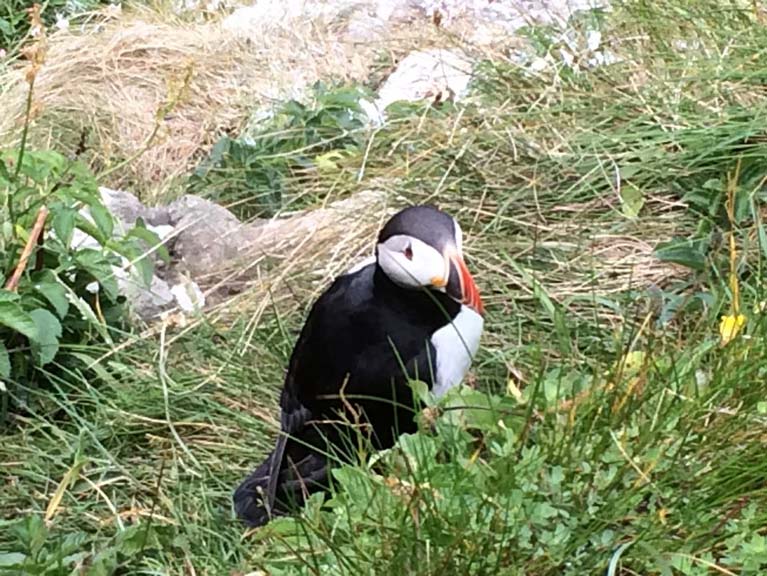 Thar be a Puffin!
Thar be a Puffin!
The noise is something else, and as you stand among them, incoming puffins whizz past your ears as they land with a bill full of sand eels to feed their young in burrows in the ground. There is also an enormous colony of guillemots that set up a tremendous racket, raising their young on the most precarious cliffs across from the viewing point. Even Kieron, a confirmed non-romantic, admitted to being impressed by the place. The pilotage in and out of Lunga is a bit dicey with rocks all round but in calm weather is tenable during the day.
On through the passage between Iona and the Ross of Mull to Tinker's Hole where we dropped the hook overnight. This is a curious place, perfectly tucked away and a high stopping point on the journey back south. Next day we picked our way through the litter of rocks and islets off Erraid on the way to Scalasaig to await the turn of the tide in the narrow sound between Islay and Jura. The weather had pretty much played ball all trip and pilotage had been mainly by eyeball, cross-checking on the plotter and keeping a backup on paper charts. We'd learned the hard way always to keep paper charts available when crossing the Irish Sea at night when everything electrical sat down. That was an early lesson learned, and I wouldn't fancy being caught out among some of this coastline in adverse conditions without a fix.
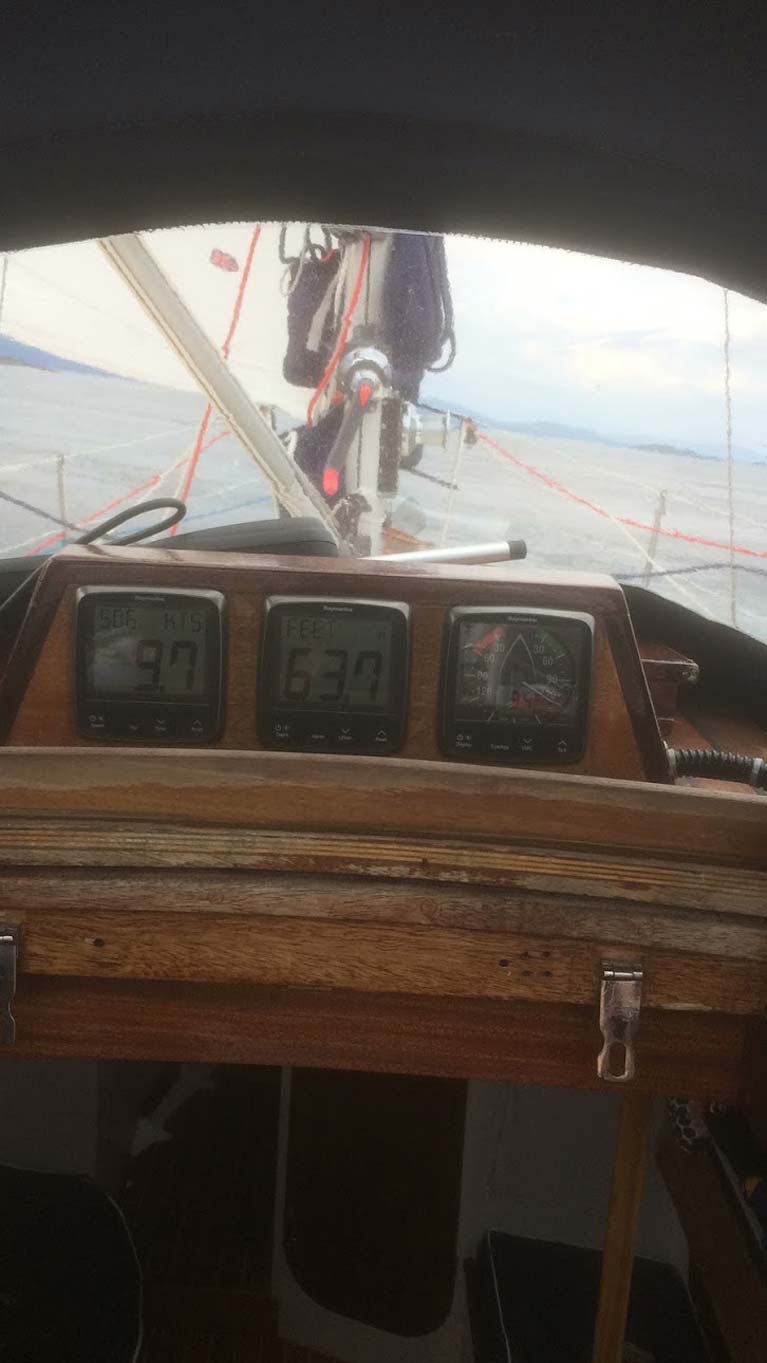 Hauling ass at 9.7 knots
Hauling ass at 9.7 knots
As the tide turned south again, we left Scalasaig and were sucked into the sound logging 9.7 kts over the ground. In a 10 ton, long keeled boat, this is shifting. Rounding Ardmore Point at the southeastern end of Islay we were met with a decidedly rotten sea-state and bumped our way along an inshore passage to Port Ellen. To ease sheets and head for lovely Gigha again was sorely tempting but we sucked it up on the basis that the wind angle could make the run across the North Channel a challenge the next day. While the marina facilities are excellent, perhaps we hit Port Ellen on a slow night, and we were distinctly underwhelmed by the place. After a dram in a local hostelry, we retired on board to inspect a bottle of Jameson we had overlooked earlier in the trip.
As so often happens, we could have spent a pleasant night on Gigha after all as the next morning we awoke to lots of fog but no wind. So we had to motor for several hours to make the tidal gate in the North Channel which we did and arrived in Glenarm mid-afternoon. Up to Stevie who runs a great pub called The Bridge End Tavern for pints and a meal. Stevie doesn't provide dining, but he has an excellent arrangement with the local takeaways who will deliver direct to your pub table; everything from fish & chips, through Chinese, Indian, Thai to Italian. As I write this, I realise the more I reveal of our culinary preferences, the more I wonder at the ICC granting us admission to its membership.
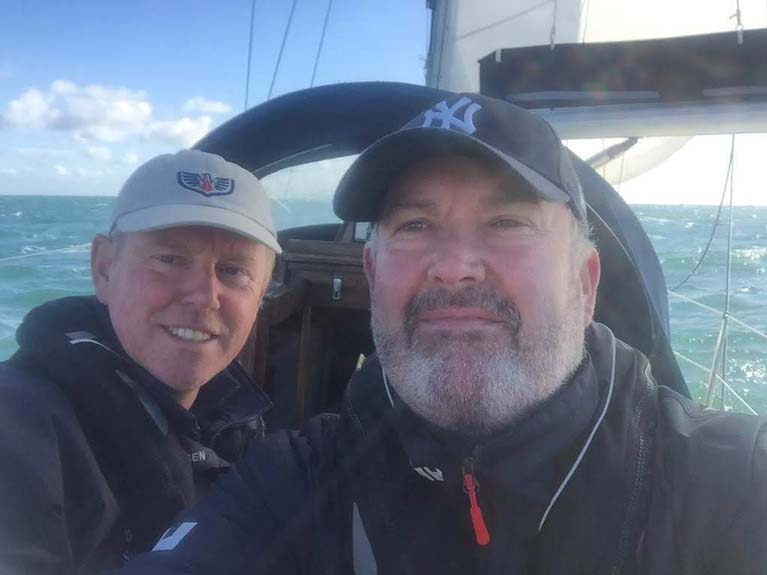 Planning Rockall via Reykjavik next year!
Planning Rockall via Reykjavik next year!
Going back down the Irish Sea is an easier prospect as once we carry the flood far enough south we don't pay the price when the tide turns later as we are nearer the slack water area off Dundalk. And so it happened. The sail past Strangford entrance was memorable in that the sunset was perfect; the company was excellent, the music was Johnny Cash hatin' San Quentin and dinner was served in a bowl in the cockpit. Chris and Adrian wanted to round off the trip with a night passage and who were we to deny them? Reaching our home club at RStGYC next day in perfect weather after 18 nights onboard was the ideal end to an (inner) Hebridean adventure. As for next year, perhaps Brittany….although Rockall via Reykjavik is still an option?


























